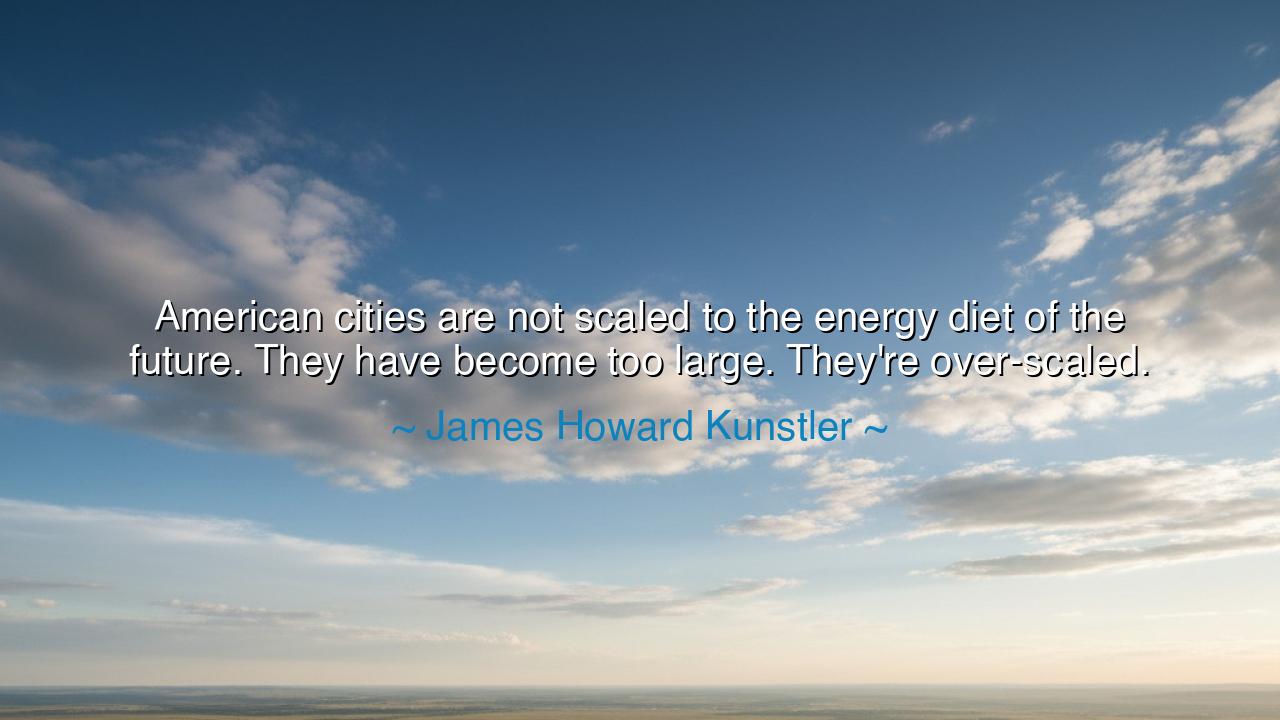
American cities are not scaled to the energy diet of the future.
American cities are not scaled to the energy diet of the future. They have become too large. They're over-scaled.






In the foretelling words of James Howard Kunstler, the urban prophet of our age, we are given a warning that echoes with the gravity of civilizations past: “American cities are not scaled to the energy diet of the future. They have become too large. They’re over-scaled.” In these words lies a lament and a prophecy—a recognition that what humankind has built in its era of abundance may not endure in the coming age of scarcity. Kunstler speaks as the seer who stands upon the walls of empire, gazing out over shining towers and sprawling highways, and whispering that all of this—this scale of excess—was never meant to last.
The meaning of his words cuts deep into the heart of modern civilization. To say that our cities are “over-scaled” is to say that they have outgrown their balance with nature. They are too vast, too dependent on the burning of ancient sunlight—fossil fuels—to sustain their motion. The wide highways, the endless suburbs, the glittering towers of glass—all are monuments to a time of cheap energy and unchecked expansion. But as the age of easy abundance wanes, Kunstler reminds us that we must learn again the wisdom of scale—to live within limits, to build not for glory but for endurance. For a civilization that forgets its scale forgets its soul.
The origin of this truth is as old as the rise and fall of empires. The Romans, in their zenith, built grand roads and aqueducts that stretched across continents. Their cities swelled with wealth and wonder—but when the energy of conquest faltered, when the costs of maintenance exceeded the fruits of expansion, the empire began to collapse under its own weight. The lesson is eternal: what grows beyond its means must one day return to balance. Kunstler, though a modern man, speaks in the voice of the ancients—reminding us that scale is the secret law of survival, and that to live beyond balance is to hasten decay.
Consider the story of Detroit, once the proud heart of American industry. It was a city built for cars, fueled by oil, and powered by the dream of endless motion. Highways spread like veins across its landscape, carrying the lifeblood of a booming age. But when energy prices rose and the engines of industry slowed, the very scale of the city turned against it. Streets emptied, buildings rotted, neighborhoods fell silent. Detroit became a symbol of over-scaling—a living monument to what happens when human ambition outpaces sustainability. Yet within its ruins also rose a quieter wisdom: the rebirth of small farms, local markets, and tight-knit communities that remembered how to live close to the earth again.
Kunstler’s “energy diet of the future” speaks of a world returning to simplicity. As fossil fuels grow scarce and the planet trembles beneath the weight of excess, humanity must learn to build differently—to craft cities that serve life, not consumption. Smaller, walkable towns; local economies; architecture that breathes with the land—these will be the cities of tomorrow. They will not gleam with the cold light of glass, but glow with the warmth of human scale. For the energy diet of the future will not be measured in horsepower, but in harmony.
The emotional force of Kunstler’s words lies in their honesty. He does not curse the city, but mourns what it has become: a machine that consumes its own foundations. Yet within that mourning lies a call to action. He calls upon humanity to rediscover the art of proportion, to trade bigness for beauty, and to remember that greatness is not measured in size, but in sustainability. For the ancient builders knew what we have forgotten—that a structure, a city, a civilization, must grow from the energy it can sustain, or it will one day crumble back into the earth from which it rose.
So, let this be the lesson: live and build within your means, not your desires. Measure life not by its scale, but by its substance. Let your communities be close enough to walk, your homes efficient enough to warm, your work meaningful enough to sustain. Learn again to love the small, for in the small lies resilience. A village built with care will outlast a metropolis built on pride. The world of tomorrow will belong not to the sprawling and the mighty, but to the balanced and the wise.
For in the end, James Howard Kunstler’s words are not a condemnation—they are a guide. He reminds us that the age of over-scaling is passing, and a new age—one of proportion, humility, and renewal—is dawning. When the cities of excess fade, humanity will build anew: smaller, slower, and stronger, grounded once more in the eternal rhythm of nature. And in that return to scale, we will find not loss, but salvation.






AAdministratorAdministrator
Welcome, honored guests. Please leave a comment, we will respond soon